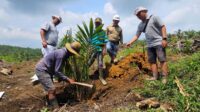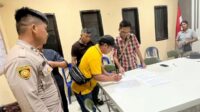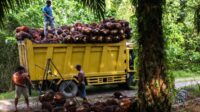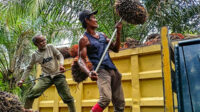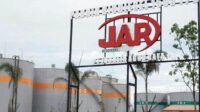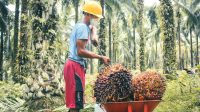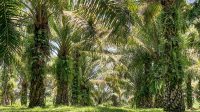PALMOILMAGAZINE, KUBU RAYA, WEST KALIMANTAN – The persistent stagnation in smallholder palm oil productivity has prompted Solidaridad Indonesia to introduce a science-based solution through regenerative agriculture. At the Indonesian Palm Oil Smallholders Conference (IPOSC) & Expo 2025—the largest event in West Kalimantan dedicated to palm oil productivity and industry—Solidaridad stood out as a civil society organization (CSO) actively advocating for sustainable transformation.
Carrying the theme “Synergy of Stakeholders to Overcome Stagnant Smallholder Palm Oil Productivity,” the conference served as a platform for Solidaridad to bridge the knowledge and technology gaps that smallholders continue to face.
Soil as a Living Ecosystem
During a session titled “Innovation in Biofertilizers and Compost as the Foundation of Regenerative Agriculture for Sustainable Palm Oil Productivity,” Solidaridad underscored the need to treat soil not merely as planting media but as a living ecosystem crucial to long-term production.
“Productivity stagnation cannot be resolved with short-term fixes. Heavy reliance on chemical inputs, without restoring soil health, only creates new cycles of problems,” said Yeni Fitriyanti, Country Manager of Solidaridad Indonesia, in a statement received by beige-heron-208544.hostingersite.com on Friday (Sept. 26).
She emphasized that the best investment for smallholders is protecting soil health as a long-term asset. Regenerative practices, she added, not only improve productivity but also enhance resilience against climate change and pest outbreaks.
Also Read: 5th IPOSC Unites Smallholders to Strengthen Sustainable Palm Oil Movement
Closing the Gap for Smallholders
Limited access to information and technology remains one of the biggest hurdles for smallholder productivity. Solidaridad seeks to close this gap by delivering practical knowledge that farmers can directly apply in their fields.
One of the key approaches promoted is intercropping, where smallholders grow corn, legumes, or horticultural crops between young palm rows. This practice not only provides alternative income streams but also strengthens the foundation of regenerative agriculture by restoring soil ecosystems, reducing dependency on chemical fertilizers, and improving resilience against extreme climate conditions.
Long-Term Education and Support
Solidaridad’s commitment to farmer education was also visible through its interactive booth at IPOSC 2025, which drew more than 1,000 participants from palm oil-producing regions across West Kalimantan.
Since 2012, Solidaridad has trained over 19,785 independent smallholders across nine districts, including Kapuas Hulu, Melawi, Sintang, Sekadau, Sanggau, Landak, Mempawah, Sambas, and Bengkayang. In 2025, the organization aims to reach an additional 9,000 farmers in 10 districts and 425 villages.
Through Farmer Field Schools (Sekolah Lapangan), smallholders receive training in good agricultural practices (GAP), financial literacy, farm management, and practical techniques such as producing liquid organic fertilizer (LOF) and compost.
Multi-Stakeholder Collaboration
IPOSC 2025 brought together diverse stakeholders, including palm oil farmers, cooperatives, plantation companies, government representatives at both national and regional levels, civil society organizations, and the media. The event reinforced the importance of multi-stakeholder collaboration in addressing stagnating smallholder productivity while paving the way for broader adoption of regenerative farming practices. (P3)






